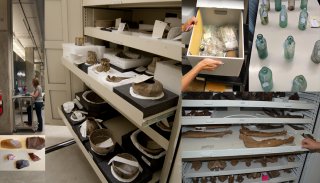
Research a State Collection
To coordinate, encourage, and preserve the full understanding of Colorado's archaeological and paleontological resources, the State encourages the study of those collections made under the authority of a state permit. Researchers and students may find useful forms, documentation, and guidance for studying state collections here.
Finding a Collection to Research
Find repositories in your area by navigating the map below. A full-text list containing contact information for current State-Approved repositories may be downloaded here.
- If you are looking for collections from a specific site, please refer to the List of Sites with Repository Names.
- If you are a student, check out the Thesis, Capstone, Interpretation List for a list of State Collections that may need re-analysis and rehousing as part of a thesis or capstone project.
Please note that these lists are not comprehensive and will be updated by OAHP periodically. Please let us know of errors and omissions with State collections. The best source of information on repository collections is the designated repository official.
Research Requests
Researchers and students may contact the repository directly to make inquiries regarding the study of held-in-trust state collections. The state trusts its repositories to handle research and loan requests as they see fit and according to our guidelines and only becomes directly involved when required.
State collections must be made available free of charge for study by qualified students and researchers.
In the event that you are unable to determine which repository contains material that would be useful for your research, please feel free to contact the State Curation Coordinator at hc_statecuration@state.co.us with your inquiry.
Please be aware that History Colorado requires all exhibits, reproductions, and studies to credit the State Archaeologist as follows: "Courtesy of History Colorado, Office of the State Archaeologist." Additionally, two copies of any publications, reports, or other documents prepared by those studying or exhibiting any part of the state collection must be provided to History Colorado.
Proposed Research Activities that Require State Approval
Please be aware of the following requirements regarding the below activities involving state collections, as per 8 CCR 1504-7. Written consent from History Colorado is necessary for these activities from the time of field collection. It's important to note that being granted a permit for research does not exempt you from this requirement.
Starting from October 14, 2024, a new online form has been introduced to expedite the request process. Researchers, permittees, and designated repository officials can now use this single form to request the necessary approvals instead of going through multiple individual request processes. You can access the new request form here: Curation Request Form. Upon submission, a notice of approval or denial will be provided to both the researcher and the designated repository official within 30 days.
For additional details on required documentation, rules, requirements, and exemptions not covered in the online form, please refer to the dropdown menus below.
Please remember that any commercial use of state collections is prohibited without written consent. Further information can be found in the Commercial Use section.
- Out-of-State Transport
-
Researchers wishing to transport collections out of the State of Colorado for any reason, must secure a loan agreement between the out-of-state facility and the approved state repository and seek consent from History Colorado through the submission of the Curation Request Form.
Any transport of collections outside of the State of Colorado for any reason, at any time, requires the written consent of History Colorado. *
- Relocation inventories must be conducted and included as part of the written loan agreement.
- The loan and transportation of the collection must be insured for liability purposes.
- Loans may not exceed 3 years, and all material must be returned to the repository within 3 years.
- Collections and their associated sites must be fully recorded and cataloged in the state system.
- Ancillary samples as specified in 8 CCR 1504-7, Sec. 9(C) 2) are not subject to this requirement.*
Required Attachments
- CV (s) of the researcher(s)
- A draft copy of the loan agreement
- Proof of insurance
- Destructive Analysis
-
Any proposed analysis of collections materials that would cause their destruction or damage, such as trace element analysis, gold coating, and histology requires the written consent of History Colorado. *
Researchers proposing to perform destructive analysis should first contact the state-approved repository and make arrangements with them for the proposed analysis. Loan agreements are required if any portion of the material is expected to survive the analysis and be returned to the repository.
- Requests are granted with consideration as to whether such artifacts/specimens are unique or duplicated in other state-owned collections.
- Collections and their associated sites must be fully recorded and cataloged in the state system.
Required Attachments
- CV (s) of the researcher(s) requesting and/or conducting analyses.
- Research Design. Please clearly outline the intended methods, sampling strategies, etc.
- A draft copy of the loan agreement if any portion of the material is expected to survive analysis and be returned to the state-approved repository.
- Physical Reproductions
-
The creation of physical reproductions through physical means (ex. molding, casting, latex peels), requires the written consent of History Colorado.
- Justification of the use of physical methods over digital is to be provided in the Curation Request Form.
- Collections and their associated sites must be fully recorded and cataloged in the state system.
Required Attachments
- CV (s) of the researcher (s) requesting and/or conducting physical reproduction.
*Ancillary samples are exempted from these requirements per 8 CCR 1504-7 and are defined as organic or inorganic specimens, other than human remains or artifacts, gathered by scientists for the purpose of analysis to provide information on past environments, diets, chronology, or material source areas. Ancillary samples may include but are not limited to, charcoal, wood, soil, coprolites, and floral or faunal specimens. Approval is still required from the State-Approved repository.
